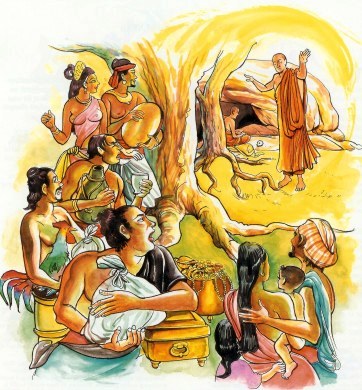Don’t indulge in heedlessness!
Don’t come near to sexual joys!
The heedful and contemplative
attains abundant bliss.
Explanation: Do not indulge in heedlessness. Avoid craving for sensual pleasures, whatever their nature. The mindful person is tranquil in mind. He will attain the great bliss.
Commentary
kamarati santhavam: the expression implies indulgence in sensual pleasures. The stanza stresses the fact that such indulgence leads to the relaxation of mindfulness and the flagging of enthusiasm for truth-seeking. The implication here is that one should not give in to attachments, whatever their nature. Therefore, the main emphasis is on the need to avoid tanha which is literally translated as “thirst”. It is this “thirst”, desire, greed, craving, manifesting itself in various ways, that gives rise to all forms of suffering and the continuity of being (bhava). But it should not be taken as the first cause, for there is no first cause possible, according to Buddhism, because everything must have a cause. So “thirst” is not the first or the only condition for the arising of sorrow. But it is an essential condition for the arising of sorrow. The term “thirst” includes not only desire for, and attachment to, sense-pleasures, wealth and power, but also desire for, and attachment to, ideas and ideals, views, opinions, theories, conceptions and beliefs. According to the Buddha’s analysis, all the troubles and strife in the world, from little personal quarrels in families to great wars between nations and countries, arise out of this “thirst”, from this point of view, all economic, political and social problems are rooted in this selfish ‘thirst’. Great statesmen who try to settle international disputes and talk of war and peace only in economic and political terms touch the superficialities, and never go deep into the real root of the problem. As the Buddha told Rattapala: “The world lacks and hankers, and is enslaved to ‘thirst’.”
Kamarati can also be described as the sensual urge. In modern language, it may be called “the impulsive urge.” The Buddha said, “What, O monk, is the origin of suffering? It is that craving which gives rise to ever fresh rebirth and, bound up with pleasure and lust, now here, now there, finds ever fresh delight.” The sensual urge is accompanied by the urge for existence or the urge for non-existence. Of this urge or Craving for Existence it is said: “No first beginning of the Craving for Existence can be perceived, O monks, before which it was not and after which it came to be. But it can be perceived that Craving for Existence has its specific condition. I say, O monks, that also Craving for Existence has its conditions that feed it and are not without it. And what is it? ‘Ignorance’, one has to reply – Craving for Existences and Ignorance are called “the outstanding causes that lead to happy and unhappy destinies (courses of existence).” Kamac-chanda means sensual desires or attachment to pleasurable sense-objects such as form, sound, odour, taste, and contact. This, too, is regarded as one of the fetters that bind one to Samsara. An average person is bound to get tempted by these alluring objects of sense. Lack of self-control results in the inevitable arising of passions. This Hindrance is inhibited by One-pointedness, which is one of the five characteristics of Jhanas. it is attenuated on attaining Sakadagami and is completely eradicated on attaining Anagami. Subtle forms of attachment such as Rupa Raga and Arupa Raga (Attachment to Realms of Form and Formless Realms) are eradicated only on attaining Arahatship. The following six conditions tend to the eradication of sense-desires, (i) perceiving the loathsomeness of the object, (ii) constant meditation on loathsomeness, (iii) sense-restraint, (iv) moderation in food, (v) good friendship, and (vi) profitable talk.
Another comment is as follows:
Dependent on feeling arises craving which, like ignorance, is the other most important factor in the “Dependent origination.” Attachment, thirst and clinging are some renderings for this Pali term. This is an aspect of the 2nd Noble Truth – Craving is threefold – namely, craving for sensual pleasures, craving for sensual pleasures associated with the view of eternalism, i.e., enjoying pleasures thinking that they are imperishable, and craving for sensual pleasures with the view of nihilism i.e., enjoying pleasures thinking that everything perishes after death. The last is the materialistic standpoint. These are also interpreted as attachment to Realms of Form and Formless Realms respectively. Usually these two terms are rendered by craving for existence and non-existence. There are six kinds of craving corresponding to the six sense objects such as form, sound and so on. They become twelve when they are treated as internal and external. They are reckoned as thirty-six when viewed as past, present and future. When multiplied by the foregoing three kinds of craving, they amount to one hundred and eight. It is natural for a worldling to develop a craving for the pleasures of sense. To overcome sense-desires is extremely difficult. The most powerful factors in the wheel of life are ignorance and craving, the two main causes of the Dependent Origination. Ignorance is shown as the past cause that conditions the present; and craving, the present cause that conditions the future. Dependent on craving is grasping which is intense craving. Craving is like groping in the dark to steal an object. Grasping corresponds to the actual stealing of the object. Grasping is caused by both attachment and error. It gives rise to the false notions, of “I” and “mine”. Grasping is four-fold – namely, Sensuality, False Views, Adherence to rites and ceremonies, and the Theory of a soul.
ma pamadam anuyunjetha: this is an admonition to those who quest for truth. If they want to succeed in reaching their goal they must never relax their mindfulness. They must not engage in activities that are likely to bring about worldliness and are likely to emphasize worldly pleasures. The non-engagement in mindfulness is a bar to proper meditation.

